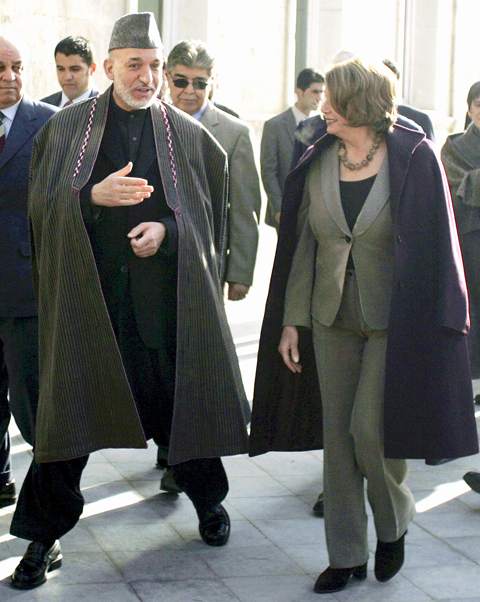The speaker of the US House met with Afghan President Hamid Karzai in Kabul yesterday for talks about the ongoing strategic review of the US mission in Afghanistan, the president’s office said.
Nancy Pelosi arrived in Afghanistan on Friday to meet with Afghan officials and US and NATO military leaders, said Captain Elizabeth Mathias, a US military spokeswoman.
Pelosi, a California Democrat, also met with US troops during her two-day visit.

PHOTO: EPA
Karzai and Pelosi talked about the US strategy review of the situation in Afghanistan and Pelosi reiterated the US’ long-term commitment to Afghanistan’s security situation and economic development, Karzai’s office said.
Afghanistan was to send a high-level delegation headed by Foreign Minister Dadfar Rangeen Spanta to the US today “to review the joint strategy and the fight against terrorism,” the Afghan Ministry of Foreign Affairs said yesterday.
Afghanistan’s interior and defense ministers, its national security director and chief of intelligence are on the delegation.
Pakistan is also sending representatives to take part in the review. Spanta and Pakistan’s foreign minister are expected to meet together with US Secretary of State Hillary Clinton.
Earlier, US Secretary of Defense Robert Gates said on Friday that Washington could accept a political agreement between the Afghan government and the Taliban if the insurgents laid down their arms and accepted the government’s terms.
He was responding to a question from a Pakistani reporter about whether a deal struck by Pakistan with Taliban fighters in the restive Swat valley could serve as a model for Afghanistan.
On Monday, Pakistan announced it would agree to the imposition of Islamic law in the northwest valley as part of an agreement aimed at restoring peace after an 18-month military campaign. The pact was spearheaded by a hard-line cleric who is negotiating with the Taliban in the valley to give up their arms.
A reporter from Pakistan’s Geo Television brought up the Swat deal and criticism of it by Richard Holbrooke, the US envoy to the region.
The reporter asked whether, if Pakistan succeeds in pacifying militant activity in Swat, the US would allow Afghans to make a similar type of agreement.
“If there is a reconciliation, if insurgents are willing to put down their arms, if the reconciliation is essentially on the terms being offered by the government, then I think we would be very open to that,” Gates said. “We have said all along that ultimately some sort of political reconciliation has to be part of the long-term solution in Afghanistan.”
Later, Pentagon spokesman Geoff Morrell said: “The secretary is too polite to take issue with the premise of the question, but he was in no way equating the prospect for reconciliation in Afghanistan with whatever deal the Pakistani government may or may not be trying to cut with militants in Swat Province.”
Gates also welcomed the fact that NATO nations have signaled a willingness to provide more troops or other assistance to the war effort.
“Countries are making new commitments on a fairly steady basis on both the civilian and military sides,” Gates said. “I expect there will be new commitments by the time of the NATO summit [in April].”

PRECARIOUS RELATIONS: Commentators in Saudi Arabia accuse the UAE of growing too bold, backing forces at odds with Saudi interests in various conflicts A Saudi Arabian media campaign targeting the United Arab Emirates (UAE) has deepened the Gulf’s worst row in years, stoking fears of a damaging fall-out in the financial heart of the Middle East. Fiery accusations of rights abuses and betrayal have circulated for weeks in state-run and social media after a brief conflict in Yemen, where Saudi airstrikes quelled an offensive by UAE-backed separatists. The United Arab Emirates is “investing in chaos and supporting secessionists” from Libya to Yemen and the Horn of Africa, Saudi Arabia’s al-Ekhbariya TV charged in a report this week. Such invective has been unheard of

US President Donald Trump on Saturday warned Canada that if it concludes a trade deal with China, he would impose a 100 percent tariff on all goods coming over the border. Relations between the US and its northern neighbor have been rocky since Trump returned to the White House a year ago, with spats over trade and Canadian Prime Minister Mark Carney decrying a “rupture” in the US-led global order. During a visit to Beijing earlier this month, Carney hailed a “new strategic partnership” with China that resulted in a “preliminary, but landmark trade agreement” to reduce tariffs — but

Chinese President Xi Jinping’s (習近平) purge of his most senior general is driven by his effort to both secure “total control” of his military and root out corruption, US Ambassador to China David Perdue said told Bloomberg Television yesterday. The probe into Zhang Youxia (張又俠), Xi’s second-in-command, announced over the weekend, is a “major development,” Perdue said, citing the family connections the vice chair of China’s apex military commission has with Xi. Chinese authorities said Zhang was being investigated for suspected serious discipline and law violations, without disclosing further details. “I take him at his word that there’s a corruption effort under

China executed 11 people linked to Myanmar criminal gangs, including “key members” of telecom scam operations, state media reported yesterday, as Beijing toughens its response to the sprawling, transnational industry. Fraud compounds where scammers lure Internet users into fake romantic relationships and cryptocurrency investments have flourished across Southeast Asia, including in Myanmar. Initially largely targeting Chinese speakers, the criminal groups behind the compounds have expanded operations into multiple languages to steal from victims around the world. Those conducting the scams are sometimes willing con artists, and other times trafficked foreign nationals forced to work. In the past few years, Beijing has stepped up cooperation